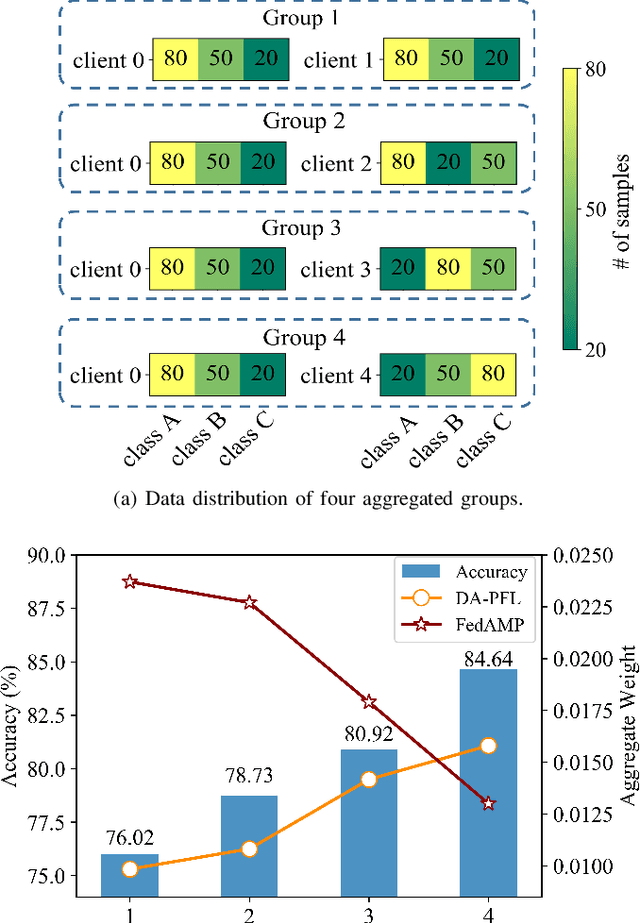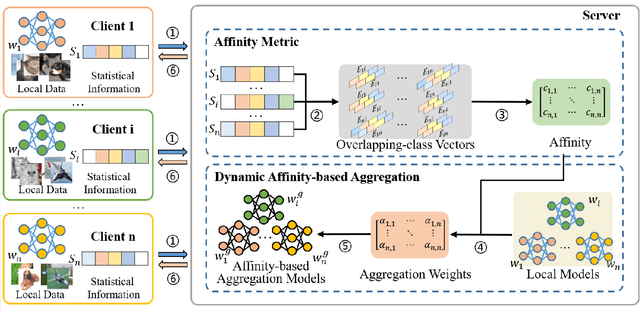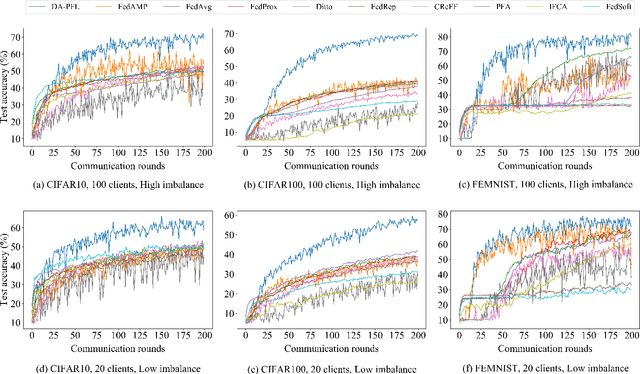Jiyuan Feng
DA-PFL: Dynamic Affinity Aggregation for Personalized Federated Learning
Mar 14, 2024



Abstract:Personalized federated learning becomes a hot research topic that can learn a personalized learning model for each client. Existing personalized federated learning models prefer to aggregate similar clients with similar data distribution to improve the performance of learning models. However, similaritybased personalized federated learning methods may exacerbate the class imbalanced problem. In this paper, we propose a novel Dynamic Affinity-based Personalized Federated Learning model (DA-PFL) to alleviate the class imbalanced problem during federated learning. Specifically, we build an affinity metric from a complementary perspective to guide which clients should be aggregated. Then we design a dynamic aggregation strategy to dynamically aggregate clients based on the affinity metric in each round to reduce the class imbalanced risk. Extensive experiments show that the proposed DA-PFL model can significantly improve the accuracy of each client in three real-world datasets with state-of-the-art comparison methods.
FedHCDR: Federated Cross-Domain Recommendation with Hypergraph Signal Decoupling
Mar 06, 2024Abstract:In recent years, Cross-Domain Recommendation (CDR) has drawn significant attention, which utilizes user data from multiple domains to enhance the recommendation performance. However, current CDR methods require sharing user data across domains, thereby violating the General Data Protection Regulation (GDPR). Consequently, numerous approaches have been proposed for Federated Cross-Domain Recommendation (FedCDR). Nevertheless, the data heterogeneity across different domains inevitably influences the overall performance of federated learning. In this study, we propose FedHCDR, a novel Federated Cross-Domain Recommendation framework with Hypergraph signal decoupling. Specifically, to address the data heterogeneity across domains, we introduce an approach called hypergraph signal decoupling (HSD) to decouple the user features into domain-exclusive and domain-shared features. The approach employs high-pass and low-pass hypergraph filters to decouple domain-exclusive and domain-shared user representations, which are trained by the local-global bi-directional transfer algorithm. In addition, a hypergraph contrastive learning (HCL) module is devised to enhance the learning of domain-shared user relationship information by perturbing the user hypergraph. Extensive experiments conducted on three real-world scenarios demonstrate that FedHCDR outperforms existing baselines significantly.
FedDCSR: Federated Cross-domain Sequential Recommendation via Disentangled Representation Learning
Sep 22, 2023Abstract:Cross-domain Sequential Recommendation (CSR) which leverages user sequence data from multiple domains has received extensive attention in recent years. However, the existing CSR methods require sharing origin user data across domains, which violates the General Data Protection Regulation (GDPR). Thus, it is necessary to combine federated learning (FL) and CSR to fully utilize knowledge from different domains while preserving data privacy. Nonetheless, the sequence feature heterogeneity across different domains significantly impacts the overall performance of FL. In this paper, we propose FedDCSR, a novel federated cross-domain sequential recommendation framework via disentangled representation learning. Specifically, to address the sequence feature heterogeneity across domains, we introduce an approach called inter-intra domain sequence representation disentanglement (SRD) to disentangle the user sequence features into domain-shared and domain-exclusive features. In addition, we design an intra domain contrastive infomax (CIM) strategy to learn richer domain-exclusive features of users by performing data augmentation on user sequences. Extensive experiments on three real-world scenarios demonstrate that FedDCSR achieves significant improvements over existing baselines.
 Add to Chrome
Add to Chrome Add to Firefox
Add to Firefox Add to Edge
Add to Edge